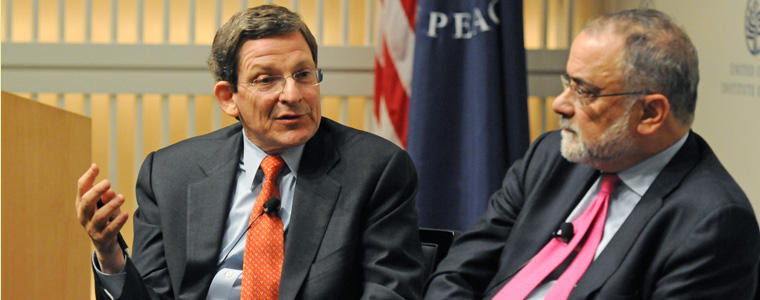USIP Hosts SRAP Ambassador Marc Grossman for a Conversation on Prospects for Peace in Afghanistan

USIP on April 10 hosted Special Representative to Afghanistan and Pakistan Ambassador Marc Grossman and others for a panel discussion on the prospects for peace in Afghanistan. Before a full house, participants discussed the need for a regional solution to the peace process, how best to define reconciliation with the Taliban, and what should or should not occur by the time NATO and the U.S. leave the country or at least prepare for transition.
Ahmed Rashid, an author and journalist, said an end to the war in Afghanistan has to be accomplished one way or another by the time the Afghanistan transition occurs in 2014.
"Part of the vision that must emerge and hopefully will emerge in the Chicago (NATO) summit has to be that the U.S. aim the NATO aim, has to be, an end to the war before you leave," said Rashid, a Pakistani journalist and author of the book "Pakistan on the Brink: The Future of America, Pakistan and Afghanistan," referring to the NATO summit in Chicago next month. "If [they] leave Afghanistan in a state of civil war, as it exists today, then I think we're looking at total failure at the end of the day."
USIP's Steve Hadley, who moderated the event, asked Grossman to respond to Rashid's idea: is ending the war even achievable by the end of 2014?
"I think we shouldn't get trapped here in the proposition that by Dec. 31, 2014, we're gone," Grossman said. That policy would prevent the U.S. from achieving many of its other policy goals in the region, he said.
The discussion also touched on reconciliation. "I think the idea that reconciliation and the process of reconciliation and the questions that are posed by reconciliation have to be dealt with in a more inclusive manner in Afghanistan, in the region, with the United States of America, is right." Afghan society, he said, is central to the question of reconciliation and therefore Afghan society has to be central to the process of reconciliation.
And because, ultimately, reconciliation is among Afghan society, the job of the U.S., Grossman said, is in the end to facilitate that dialogue.
"The role of the United States in talking to the Taliban and meeting with insurgents is one and one only, and that is to try to open the door to a conversation among Afghans about the future," Grossman said.
Nilofar Sakhi, founder and chairperson of the Women's Activities and Social Services Association, said creating more transparency within the process of reconciliation would better define the structure of reconciliation. But with that, the Afghan government must be more included, and there have been complaints among Afghans that the government has been sidelined in talks.
"There is a lot of pessimism right now," she said. "You have to show the people that something is coming out of the process… otherwise people will keep thinking negatively about the process."
Indeed, said USIP's Omar Samad, a former Afghanistan ambassador to France and now a senior expert on the country at the Institute, Afghan people "want to feel included in a process that not only takes into account their aspirations… but a transition that offers them solutions."
The group was introduced by USIP's George Moose, vice chairman of USIP's board of directors.